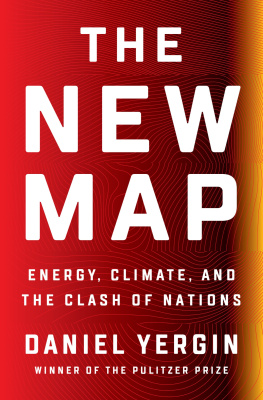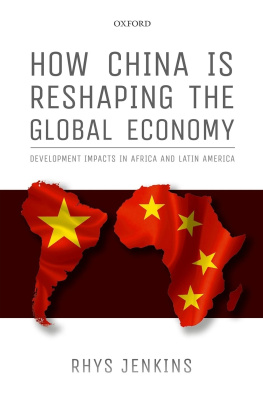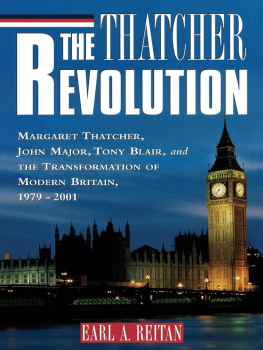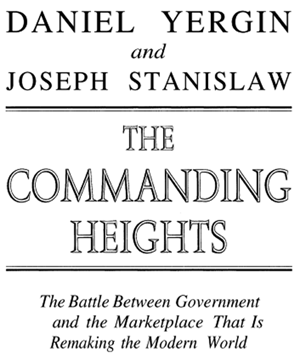
ALSO BY DANIEL YERGIN
THE PRIZE:
The Epic Questfor Oil, Money, and Power
RUSSIA 2010 (coauthor)
SHATTERED PEACE:
The Origins of the Cold War
ENERGY FUTURE (coauthor)
GLOBAL INSECURITY (coauthor)

SIMON & SCHUSTER
Rockefeller Center
1230 Avenue of the Americas
New York, NY 10020
www.SimonandSchuster.com
Visit us on the World Wide Web: http://www.SimonSays.com
Copyright 1998 by Daniel A. Yergin and Joseph Stanislaw
All rights reserved, including the right of reproduction in whole or in part in any form.
SIMON & SCHUSTER and colophon are registered trademarks of Simon & Schuster Inc.
Designed by Irving Perkins Associates, Inc.
Library of Congress Cataloging-in-Publication Data
Yergin, Daniel.
The commanding heights : the battle between government and the marketplace that is remaking the modern world / Daniel Yergin and Joseph Stanislaw.
p. cm.
Includes bibliographical references and index.
1. Economic policy. 2. Markets. 3. Privatization. 4. Deregulation. 5. Economic history1945- 6. Competition, International. I. Stanislaw, Joseph. II. Title.
HD87.Y47 1998
338.9dc21 97-49089
CIP
ISBN: 0-7432-2963-0
eISBN: 978-0-7432-2963-0
http://www.Simonspeakers.com
To Angela, Alexander, and Rebecca Yergin and To Augusta, Louis, Katrina, and Henry Stanislaw
CONTENTS
AT THE FRONTIER Introduction

BOOKS BEGIN in unexpected places. This book began in part on a summers day on the outskirts of Moscow. The Izmailovo outdoor market sprawls over acres on the southwest edge of the city, almost at the very end of the subway line. Its transformationfrom a park for exhibiting painting and crafts into a vast bazaarwas one of the earliest and most visible signs of communisms collapse and the transition to an economy that was no longer state controlled but responded to the demands of the marketplace.
The past and future were simultaneously on sale. Oil paintings of snowy villages and religious icons, many of dubious origin, were commingled with South Korean electronics and cheap videocassettes. Stalls competed to sell old dishes and stained uniforms, czarist mementos, and pins decorated with Lenins face. There were carpets from Central Asia, swords from the Caucasus, and military souvenirs from both czarist and Red armies. And everywhere were the matrioshki, wooden dolls within dolls, but of endless variationnot only the traditional peasant women but also a host of other characters, from Soviet leaders and American presidents to the Harlem Globetrotters. The favored mode of payment for all of this was the dollarthe same dollar whose possession only a few years earlier could have resulted in a stiff prison term.
The market drew all sorts of people, including, on this particular day Sir Brian Fall, the then British ambassador. As a career diplomat in the Foreign Office, Fall had dealt with Soviet and Russian affairs for thirty years, going back to the cold war days of George Smiley. In between, he had held a number of other positions, including senior adviser to three foreign secretaries as well as high commissioner to Canada. This day, however, he was at Izmailovo with his wife and daughter not for diplomatic purposes but, like everybody else, to shop. They were looking for a painting of a rural village scene, an evocation of traditional Mother Russia. But Sir Brian, every now and then, still had to stop to remind himself that the dramatic changes in modern Russia were really happening. Every stall at Izmailovo brought one face-to-face with that change. The market was a metaphor for a society disjointed and confused, but also reenergized, experiencing a transition more wrenching and more rapid than Russians could comprehend, having passed through a revolution they had not anticipatedand were certainly not prepared for.
How much easier it would have been for the Russians, he said as we wound down one of the aisles, if the Soviet Union had collapsed in the 1960s or 1970s.
Why?
Because that was when government intervention loomed large in the West, and national planning and state ownership were the methods of the day. That would have made it much more acceptable for Russia to hold on to its huge state-owned companies and keep pumping money into them, no matter how big the losses. And then the move to a market economy would not have been so severe and traumatic.
His observations brought into sudden and sharp focus how much has changed around the world since the 1970s in thinking about the appropriate relationship between state and marketplace. What was the conventional, indeed the dominating, wisdom of that time is now widely criticized, and in some cases discredited and abandoned. What seemed to be ideas on the fringe, or even beyond the fringe, discussed only around a few seminar tables, have now moved into the center. As a consequence, economies almost everywhere are being reordered, in some cases radically, with immense and far-reaching effects.
All around the globe, socialists are embracing capitalism, governments are selling off companies they had previously nationalized, and countries are seeking to entice back multinational corporations that they had expelled just two decades earlier. Marxism and state control are being jettisoned in favor of entrepreneurship; the number of stock markets is exploding; and mutual fund managers have become celebrities. Today, politicians on the left admit that their governments can no longer afford the expansive welfare state, and American liberals recognize that more government may not hold the solution to every problem. Many people are being forced to reexamine and reassess their root assumptions. These changes are opening up new prospects and new opportunities throughout the world. The shift is also engendering, for many, new anxieties and insecurities. They fear that government will no longer be there to protect them as they become increasingly intertwined in a global economy that seeks to ignore national borders. And they express unease about the price that the market demands of its participants. Shocks and turbulence in international capital markets, such as those that roiled Latin America in 1995 and Southeast Asia in 1997, turn that unease into fundamental questions about the danger and even legitimacy of markets. But all these viewpoints need to be set in context.
Why the Shift?
Why the move to the market? Why, and how, the shift from an era in which the statenational governmentssought to seize and exercise control over their economies to an era in which the ideas of competition, openness, privatization, and deregulation have captured world economic thinking? This question, in turn, begets others: Are these changes irreversible? Are they part of a continuing process of development and evolution? What will be the consequences and prospectspolitical, social, and economicof this fundamental alteration in the relationship between government and marketplace? These are the basic questions that this book seeks to answer.














